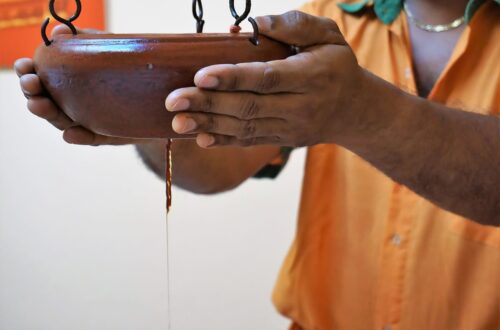
Exploring the Doshas: Understanding Your Unique Body Type in Ayurveda
Ayurveda, the ancient holistic system of medicine originating in India, places great emphasis on understanding an individual’s unique body constitution, or dosha.
Doshas are the fundamental energies or principles that govern various physiological and psychological functions within the body.
Exploring and understanding your dosha is an essential aspect of Ayurvedic practice, as it helps you make informed lifestyle choices to maintain balance and promote overall well-being.
According to Ayurveda, there are three primary doshas: Vata, Pitta, and Kapha.
Each dosha is composed of a combination of the five elements – ether, air, fire, water, and earth – and possesses distinct qualities and characteristics. These doshas are present in varying proportions in every individual, forming their unique constitution.
In this blog, we will delve into the concept of doshas and how understanding your unique body type can empower you to make informed choices for a balanced and healthy life.
So, sit back, relax, and Get ready to discover your true self!
The Essence of Ayurveda:
Ayurveda, derived from the Sanskrit words “Ayur” (life) and “Veda” (knowledge), is more than just a medical system. It is a way of life that emphasizes the integration of body, mind, and spirit to achieve optimal health and well-being.
Ayurveda is based on the principle that each person is unique and that the balance or unbalance of the three doshas—Vata, Pitta, and Kapha—affects each person’s health.
Learning about the Doshas:
The doshas represent the fundamental energies or principles that govern various functions within our bodies. They are derived from the five elements – ether, air, fire, water, and earth – and possess distinct qualities and characteristics.
Let’s explore each dosha in detail:
a) Vata Dosha: The Essence of Movement
Vata, composed of ether and air elements, governs movement, communication, creativity, and the nervous system. Individuals dominated by Vata are often energetic, enthusiastic, and quick-thinking.
They usually have a slender build, dry skin, and cold hands and feet. However, imbalanced Vata can lead to anxiety, restlessness, digestive issues, and insomnia.
b) Pitta Dosha: The Essence of Transformation
Pitta, a combination of fire and water elements, governs digestion, metabolism, and transformation within the body. Pitta-dominant individuals are often ambitious, focused, and intelligent.
They have a moderate body build, warm skin, and a strong appetite. However, an imbalanced Pitta can manifest as anger, irritability, inflammation, and digestive disorders.
c) Kapha Dosha: The Essence of Stability
Kapha, composed of water and earth elements, governs stability, structure, and lubrication in the body. Kapha-dominant individuals are generally calm, grounded, and nurturing.
They have a sturdy body frame, smooth skin, and a tendency to gain weight easily. Imbalanced Kapha can result in lethargy, weight gain, congestion, and attachment.
Discovering Your Unique Body Type:
Now that we have explored the doshas, it’s time to uncover your unique body type. Understanding your predominant dosha is crucial, as it allows you to tailor your lifestyle choices to maintain balance and promote overall well-being.
In Ayurveda, various factors such as physical characteristics, personality traits, and lifestyle patterns are taken into account to determine your doshic composition.
Embracing Ayurvedic Wisdom for Balance:
Once you have identified your dominant dosha, Ayurveda provides personalized recommendations to maintain or restore harmony within your body and mind.
These recommendations encompass dietary guidelines, herbal remedies, lifestyle modifications, daily routines, exercise practices, and stress management techniques.
Let’s explore some examples:
a) Vata-Balancing Tips: Embrace Warmth and Routine
If you have a dominant Vata dosha, you can benefit from incorporating warm, grounding foods into your diet, establishing a regular routine, practicing gentle exercises like yoga or tai chi, and ensuring adequate rest and relaxation.
These lifestyle choices help to counterbalance Vata’s tendency for anxiety, restlessness, and digestion issues.
b) Pitta-Balancing Tips: Cool and Soothe
For those with a predominant Pitta dosha, focus on incorporating cooling and soothing foods into your diet, engaging in relaxation practices such as meditation or aromatherapy, avoiding excessive heat and intense exercise, and maintaining a balanced work-life schedule.
These lifestyle choices help to pacify Pitta’s tendencies towards anger, inflammation, and digestive disorders.
c) Kapha-Balancing Tips: Energize and Stimulate
If Kapha is your dominant dosha, incorporating lighter, stimulating foods into your diet and engaging in regular moderate-intensity exercises like jogging or dancing, will cultivate mental and physical agility.
Avoiding excessive attachment can help to balance Kapha’s tendencies towards lethargy, weight gain, and congestion.
How to determine your predominant dosha:
An Ayurvedic practitioner may assess various factors, including physical characteristics, personality traits, and lifestyle patterns. They may ask questions about your body build, digestion, sleep patterns, energy levels, emotional tendencies, and preferences.
Additionally, they may examine your pulse, tongue, and other physical signs to further evaluate your doshic balance.
Balancing your doshas:
Once you understand your dosha, Ayurveda provides personalized recommendations to maintain or restore harmony within your body and mind. These recommendations typically include dietary guidelines, herbal remedies, lifestyle modifications, daily routines, exercise practices, and stress management techniques tailored to your specific doshic needs.
It is important to note that while Ayurveda recognizes the significance of doshas, it also acknowledges that individuals are unique and that their doshic composition can change over time or in response to various factors such as seasons, age, stress, and diet.
Ayurvedic treatments aim to bring balance to the doshas rather than suppressing or eliminating any particular dosha completely.
Conclusion:
Exploring the doshas and understanding your unique body type in Ayurveda is a valuable tool for self-awareness and achieving optimal health. By recognizing and addressing the imbalances specific to your dosha, you can make informed choices to create a lifestyle that supports your overall well-being and harmony.
It is always recommended to consult with a qualified Ayurvedic practitioner for an accurate dosha assessment and personalized guidance.
This is just the beginning of your Ayurvedic journey, and there is so much more to explore and discover. Stay tuned for more Ayurvedic wisdom in our next blog for each Dosha in Detail.


You May Also Like

Ayurvedic Cleansers: How to Become Your Body’s Natural Healer
3 July 2025
Brew Your Way to Better Health: Top Ayurvedic Kadha Recipes
14 February 2025

4 Comments
9tI2j.newcn.win
Appreciate the recommendation. Willl tryy iit out.
[email protected]
Glad You Liked Them.
Bryanvob
Thanks for wonderful info. What trips can you recommend in 2024? Astro tourism, eco diving, home swapping, train stations are the new food destinations,sports tourism, coolcationing, gig tripping, private group travel?
Pingback: